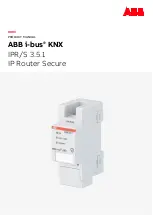
30
System Wiring
© 2011 Apollo Security Inc.
AC powered locks will not allow use of a diode for suppression. There are available suppressors for use with
AC powered locks called Metal Oxide Varistors (MOV’s). These are sometimes included with the lock. If you
wish to use AC powered strikes and a suitable suppressor is not supplied with the lock, you must contact the
manufacturer of the lock for information on obtaining a suitable suppressor. Connection of the suppressor
should follow the instructions provided with the lock.
3.6.3
Strike Wiring, Internal Relay
The AAN-4 Reader Interface includes internal relays for door strike control for each of the four reader inputs.
This relay is capable of switching up to 24 volts at up to 2 amps. If the lock installed on the door requires
more than 2 amps to control, an external relay must be provided. The power that is provided to the locking
device (strike) through this relay may be connected to the same power supply that is providing power the
reader if the strike requires 12 or 24 volts DC. IF THE STRIKE REQUIRES A VOLTAGE OTHER THAN 12
OR 24 VOLTS DC OR ANY AC VOLTAGE, A SEPARATE POWER SUPPLY MUST BE USED.
Use of the internal strike relay allows for simple connection of the door strike without requiring installation of
external ADA-10/11 relay modules. This will result in reduced installation costs at the expense of increased
security. Use of the external, high-security, relay modules (ADA-10/11) will provide increased security on the
strike output.
The diagram below illustrates connection of a DC powered, Fail-Secure, door strike. This type of strike
requires power to release the door. The power will be supplied through the normally open (NO) relay contact
of the strike relay. No power will be provided to the strike until the reader activates the internal relay. The
reader will activate the relay as a result of a valid access request (card swipe, card swipe plus valid PIN,
valid PIN entry only, etc.). The reader will also permanently activate the strike relay if commanded by the
host software to be “unlocked”. The reader may also be configured to activate the relay if the exit pushbutton
is depressed. Some software systems may allow configuration of this feature (activate strike relay on exit
pushbutton) and others may not.
Strike
+
_
Strike Power
May Be Same As Reader
if 12 or 24 VDC
Install Supressor at Strike
(see above text)
+
_
Common
"C"
Normally Open
"NO"
Figure 3.7.3.1 Strike Wiring Diagram - Fail Secure.
A wiring example for Fail Secure wiring. Refer to
Table 2.1 for exact locations of strike relay connections for the AAN-4.
Summary of Contents for AAN-4
Page 6: ...Part Introduction I ...
Page 10: ...Part Hardware Layout II ...
Page 21: ...Part System Wiring III ...
Page 42: ...Part Software Configuration Utilities IV ...
Page 45: ...40 Software Configuration Utilities 2011 Apollo Security Inc ...
Page 53: ...Part Troubleshooting V ...
Page 55: ...Part Specifications VI ...
Page 57: ...Part Supplemental Figures VII ...
Page 58: ...53 AAN 4 Hardware Manual 2011 Apollo Security Inc 7 Supplemental Figures ...
Page 59: ...54 Supplemental Figures 2011 Apollo Security Inc ...
Page 60: ...55 AAN 4 Hardware Manual 2011 Apollo Security Inc ...
Page 61: ...56 Supplemental Figures 2011 Apollo Security Inc ...
Page 62: ...57 AAN 4 Hardware Manual 2011 Apollo Security Inc ...
Page 63: ...58 Supplemental Figures 2011 Apollo Security Inc ...
Page 64: ...59 AAN 4 Hardware Manual 2011 Apollo Security Inc ...
Page 65: ...Part Table of Figures VIII ...
Page 67: ...Part Revision History IX ...
















































